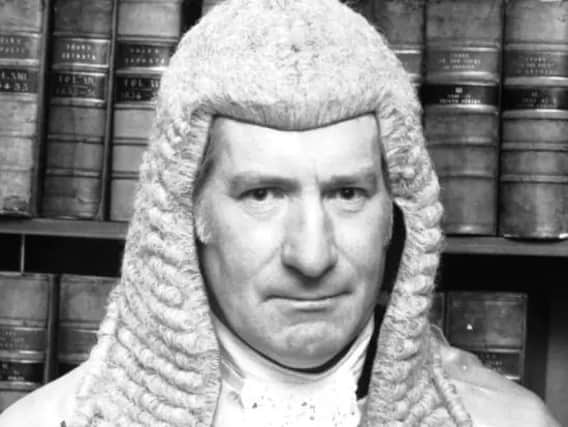Apology call for '˜gay scandal' that ended Lord Dervaird's career


Leading gay rights advocate Peter Tatchell has demanded an apology from former Scottish Secretary Sir Malcolm Rifkind over his role in the resignation of high court judge Lord Dervaird, who stood down in December 1989 over fears tabloids were about expose an affair with another man.
Documents released by the National Archives in London reveal the so-called ‘Magic Circle’ scandal was discussed at the highest levels of government, with Margaret Thatcher briefed ahead of Lord Dervaird’s resignation and the fallout discussed at cabinet.
Advertisement
Hide AdAdvertisement
Hide AdClaims about a group of gay judges and lawyers allegedly involved in a conspiracy to pervert the course of justice promoted an inquiry that failed to substantiate any allegations, and no criminal wrongdoing by members of the bench was ever uncovered.
Rumours about the sexuality of senior judges erupted into the public domain with Lord Dervaird’s abrupt resignation on 22 December, which followed a meeting with Mr Rifkind and the Lord President of the Court of Session, Lord Hope.
Subsequent press reports suggested Lord Dervaird had resigned after his “position had become untenable”, and an inquiry concluded that he had “tendered his resignation”.
However, a briefing note addressed to the Prime Minister on the morning Lord Dervaird stood down reveals Lord Hope and Mr Rifkind had “concluded that Judge Dervaird should be asked to resign”.
In the note, Mrs Thatcher’s private secretary Paul Gray warns her that “Malcolm Rifkind’s office have rung me to alert us to the imminent resignation of one of the Scottish High Court Judges, Judge Dervaird.”
Mr Gray continues: “The background is speculation in press circles that three Scottish Judges have been involved in a homosexual scandal.
“This has been looked into by the Lord President (the senior Scottish judge) and the Secretary of State, who concluded that Judge Dervaird should be asked to resign.
“Apparently, nothing illegal has been uncovered, but he does seem to have allowed his widespread activities to have been conducted in a public way.” The names of two other judges have been redacted from the briefing.
Advertisement
Hide AdAdvertisement
Hide AdThe matter was later raised at cabinet on 18 January following questions in the House of Commons from the SNP MP Jim Sillars. Ministers feared the fallout from Lord Dervaird’s resignation could force the government to make a statement in parliament.
A cabinet minute reveals how ministers discussed “press reports of alleged homosexual activities by senior members of the Scottish judiciary.”
Cabinet was told that the rumours of “homosexual activity by other senior Scottish judges” may have been inflamed by Lord Hope himself, after he summoned Scottish newspaper editors for an “unattributable briefing” on the matter.
However, despite having “the object of making clear that there had been no cover up of improper behaviour,” Lord Hope’s detailed briefing fuelled the rumours and led to further pressure for a statement and forced other judges into sensational public denials.
Circumstances around Lord Dervaird’s resignation were later examined as part of an inquiry by William Nimmo Smith QC, who found that the judge’s homosexuality “did not expose him to the risk of blackmail” and dismissed any claims that his conduct as a judge “had in any way been affected by the matters which led to his resignation”.
The only substance to the rumours was found to be that Lord Dervaird “carried on a homosexual relationship with a certain person, secretly but in such a way that they had been seen together in certain places in London”.
Mr Tatchell, who protested at the time of the resignation, said: “It is outrageous that Lord Dervaird was pressured to resign and that government officials called his homosexuality a scandal, even though he’d committed no unlawful act.
“Even worse, the Secretary of State apparently agreed that he should be asked to resign. Malcolm Rifkind should confirm whether he recommended Dervaird’s resignation and, if so, apologise. It ruined the career of an otherwise respected judge.”
Advertisement
Hide AdAdvertisement
Hide AdAsked about the contents of the declassified papers, Mr Rifkind said: “Peter Tatchell is seriously misinformed. Lord Dervaird’s sexual orientation was not the reason for his resignation.
“The issue that had arisen was as to his behaviour and whether it had been appropriate for a senior judge.
“After discussion with Scotland’s senior judge, the Lord President of the Court of Session, Lord Dervaird concluded that he wished to resign. He, subsequently, had a successful career as a distinguished academic professor.”
Mr Rifkind added that he could not recollect any further detail about the conduct that led to Lord Dervaird’s resignation.
When contacted by journalists about the reason behind the resignation, Lord Hope referred back to language in the 22 December briefing about Lord Dervaird’s relationship being “conducted in a public way”.
After leaving the bench, Lord Dervaird joined the law faculty at the University of Edinburgh, where he taught until his retirement in 1998. He died in 2015, aged 80.